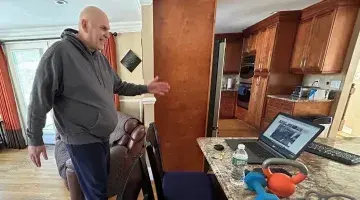Finding a Path Forward to Wellness – Cardiac Rehab Patient Shares His Journey
Author

South Shore Health
Congestive heart failure.
That’s the frightening three-word diagnosis Sean Kiley was facing last summer at just 55 years old.
Shortness of breath brought the Bridgewater resident to South Shore Hospital’s Emergency Department, where tests showed both his blood pressure and heart rate were high, and his EKG erratic.
While he knew something wasn’t right, Kiley wasn’t expecting such dire news about his health.
“I was shocked by the diagnosis,” said Kiley, who was admitted to the hospital for several days to undergo more testing for his heart.
During his hospital stay, Kiley said he had plenty of time to scroll through his phone and research what a heart failure diagnosis meant for his long-term health and life expectancy.
“It was scary waiting to see what the cause and effect of this would be,” he said.
Fortunately, Kiley said cardiologist Steven DiPillo, MD helped keep him calm and focused as further testing was done to evaluate his condition, and come up with a treatment plan.
“They needed to figure out where I was on the spectrum of heart failure.”
There was no root cause for his heart failure, but Kiley said being overweight, combined with his sedentary lifestyle and poor eating habits over many years, contributed to the condition.
Imaging showed that Kiley’s heart was enlarged and was not pumping blood efficiently. His ejection fraction – the percentage of the total amount of blood in the heart pumped out with each heartbeat – was low. A normally functioning heart has an ejection fraction of 50% or above; Kiley’s ejection fraction was just 22%.
There was concern that Kiley’s heart was irreversibly damaged and may not rebound to full function.
The sobering news was a wakeup call for Kiley, who knew he had to make immediate and significant lifestyle changes so he could be there for his family – including his wife, Tara and 14-year-old son, Declan.
Kiley began taking medications that will manage his condition, control his blood pressure and help his heart pump more efficiently.
He also changed his diet and began losing weight. Two months after his hospitalization, another MRI showed slight improvement – his ejection fraction was 27% -- but Kiley said he knew he needed to start an exercise regimen to help his heart and improve his health.
Kiley started walking slowly on a daily basis, but was tentative about exercising on his own.
“I was experiencing regular angina, and didn’t know if I should walk through the discomfort,” Kiley said. “I didn’t know how much I should push myself. I needed guidance and confidence to help me start exercising regularly.”
South Shore Health’s Cardiac Rehabilitation program gave him both.
Kiley began the 12-week program in mid-October and said he instantly “felt very safe” working out under the watchful eyes of his cardiac rehab team.
All cardiac rehab patients participate in structured exercise sessions, tailored to their individual needs and updated at frequent intervals throughout the program. Heart rate, rhythm and blood pressure are monitored before, during and after exercise.
“I could watch on a screen how my body was responding to every activity,” he said, noting that he never felt pain or discomfort while exercising at cardiac rehab.
“Being able to exercise in a safe place, gave me the confidence to push myself and build up my endurance,” he said.
“When I started cardiac rehab, I could walk on the treadmill for 5 or 6 minutes. When I left cardiac rehab, I could run on the treadmill for 20 minutes, and felt confident I could do that anywhere.”
Kiley credits the cardiac rehab team for asking tough questions, like “how will you maintain your fitness level after you leave the program?”
Half-way through cardiac rehab, Kiley answered that question by joining a gym, adding three more days of exercise to his schedule.
Cardiac rehab helped Kiley create a healthy exercise routine, which he has maintained, working out four or five days a week using tools and techniques he learned through the program.
Kiley is also sticking to a healthy diet, which along with exercise has helped him drop 55 pounds so far. His goal is to lose another 30-40 pounds and Kiley said he’s confident he will not only reach that goal but will be able to maintain the weight loss.
In just eight months, Kiley’s hard work and commitment to his health has paid off.
"I feel tremendously better. Through cardiac rehab and my current workout routine, maintaining strong cardiac health has made me feel healthier every day. I haven’t felt this healthy in 15 years – maybe more.”
Recent tests of his heart back that up. An echocardiogram from December showed that Kiley’s ejection fraction is up to 55% and his heart is operating normally without signs of damage.
“I count myself very lucky,” he said. “I don’t know how I was able to recover the way I did.”
Kiley is especially grateful to the cardiac rehab team that gave him the inspiration, support and guidance to improve his health and change his life.
“Cardiac rehab can’t cure heart disease, but it can give you confidence there is a path forward to wellness."
Learn more about Cardiac Rehabilitation and Heart and Vascular Care at South Shore Health.
Author

South Shore Health










